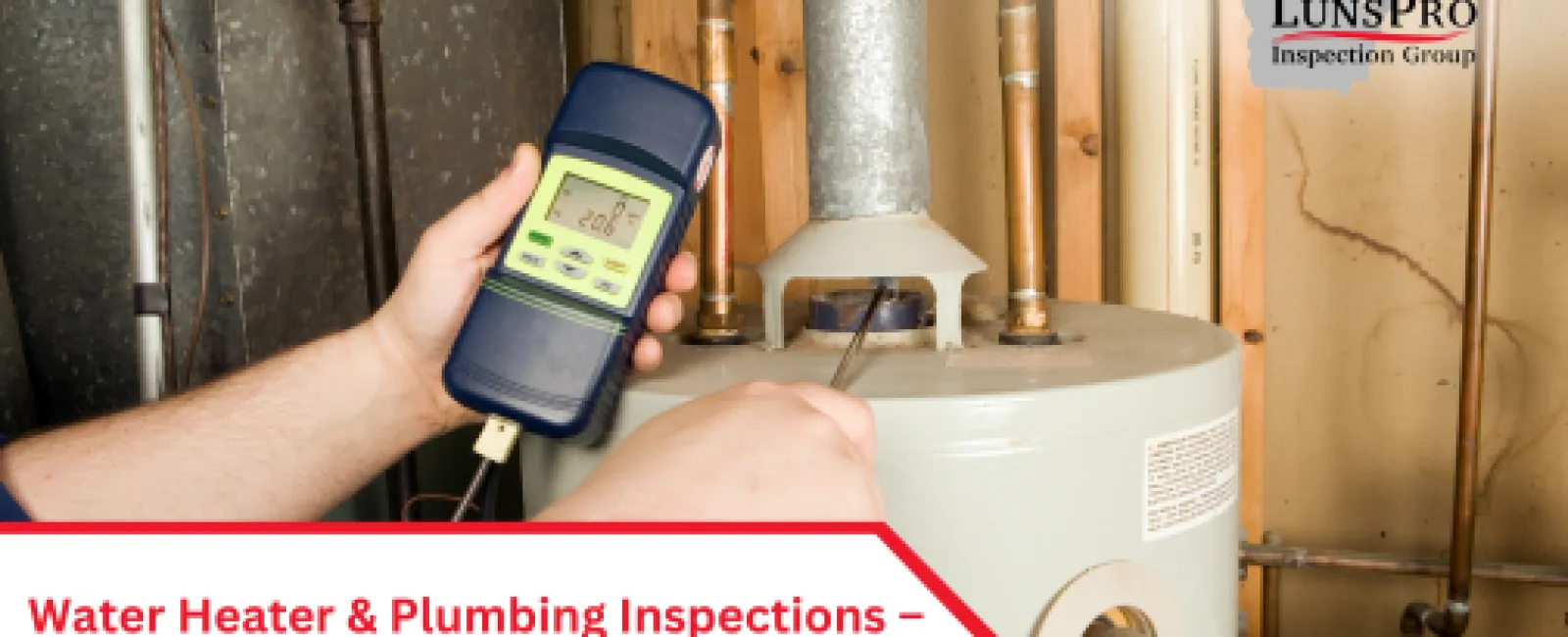Plumbing is one of the most critical systems in any home or commercial building, yet it's often overlooked—until something goes wrong. A small leak, hidden corrosion, or a faulty water heater can lead to major damage, skyrocketing utility bills, or even dangerous conditions. For homeowners in the Triad and Triangle Areas, understanding the health of your plumbing system and water heater isn't optional—it's essential for long-term safety, comfort, and cost control.
At LunsPro Inspection Group, we've performed thousands of Charlotte, Greensboro, and Raleigh Residential and Commercial Inspections, and plumbing issues are among the most common hidden problems we uncover. In this article, we'll walk you through exactly what a professional plumbing and water heater inspection entails, the red flags we look for, and how catching these problems early can help prevent foundation damage, water intrusion, and expensive repairs down the line. Whether you're buying, selling, or maintaining your home, a thorough inspection is your first line of defense.
Why Plumbing Inspections Matter in the Carolinas
Homes and buildings in the Carolinas are subjected to a variety of environmental factors—fluctuating temperatures, high humidity, and varying soil conditions. These elements can accelerate wear and tear on your plumbing system, especially in homes with crawl spaces or basements, which are common in areas like Charlotte, Greensboro, and Raleigh.
In older homes throughout the Triad and Triangle Areas, outdated materials such as galvanized steel or polybutylene pipes can present serious risks. Even in newer construction, poor installation practices or cheap components can lead to long-term issues if not identified early.
Just as importantly, water leaks—no matter how small—can introduce moisture that affects your foundation, encouraging mold growth, wood rot, and settlement. That's why Carolina home inspections that include a detailed evaluation of your plumbing system are key to preserving your home's structural integrity.
What's Included in a Plumbing and Water Heater Inspection
When LunsPro Inspection Group inspects a property's plumbing system and water heater, we follow a detailed and systematic process. Here's a breakdown of what we examine:
1. Water Heater Condition and Safety
The water heater is a vital part of your plumbing system, providing hot water for bathing, cooking, and cleaning. But when it fails or malfunctions, it can create safety hazards or lead to water damage.
We Inspect For:
-
Age and installation quality
Older units (10+ years) are more likely to leak or fail. We check the manufacturer date and look for signs of wear. -
Location and drainage
Water heaters installed in attics or interior closets without proper drain pans or catch systems are a high risk for water damage. -
T&P (Temperature and Pressure) relief valve
A critical safety feature. We ensure it's installed correctly and not leaking. -
Corrosion or rust on tank and connections
This indicates deterioration and may suggest a failing tank or poor water quality. -
Venting and combustion (for gas heaters)
Improper venting can lead to carbon monoxide buildup or fire risk. -
Expansion tanks
In closed-loop systems, these help regulate pressure. We check for proper installation and condition.
2. Main Water Line and Shut-Off Valve
A properly functioning main shut-off valve is crucial in case of emergencies like pipe bursts or flooding. We make sure it's:
-
Easy to locate and access
-
Fully operational
-
Not corroded or seized
We also inspect the main water supply line coming into the house, especially in older homes where outdated or degraded piping can cause low water pressure or contamination risks.
3. Pipe Materials and Condition
Throughout the Triad and Triangle Areas, we encounter a range of piping materials—some safe and others problematic.
We Identify:
-
Copper - Durable but vulnerable to pinhole leaks if water pH is off
-
PEX - Common in newer homes, but needs proper support and installation
-
CPVC - Older plastic piping that can become brittle
-
Galvanized steel - Prone to corrosion and scaling; often near end of life
-
Polybutylene - A major red flag; known for failure and no longer code-approved
We look for leaks, corrosion, discoloration, and support brackets to ensure lines are secure and functional.
4. Drainage and Waste Lines
Drainage issues can lead to backups, foul odors, and contamination. We assess:
-
Proper slope of drain lines
-
Venting to prevent gurgling and slow drains
-
Material integrity (especially in cast iron systems, which can rust internally)
-
Signs of clogs or slow flow
We also check the connection points between fixtures (sinks, toilets, showers) and drain pipes to ensure tight seals and no signs of past or active leaks.
5. Crawl Space and Foundation Moisture from Plumbing
In North Carolina, crawl spaces are common—and they are vulnerable to hidden plumbing leaks. During our Carolina home inspections, we always inspect crawl spaces for:
-
Standing water or signs of prior leaks
-
Wet insulation or wood rot
-
Dripping supply or drain lines
-
Discoloration, mildew, or mold
-
Soft soil or settling under footings
Even small, slow leaks in a crawl space can destabilize a foundation over time. Our inspections help identify these issues early so they can be repaired before they cause permanent damage.
6. Exterior Plumbing Features
Plumbing doesn't stop at the foundation. We also inspect:
-
Hose bibs for leaks or improper backflow prevention
-
Irrigation system connections for functionality and leakage
-
Exterior drainpipes and sump pumps (if applicable)
-
Septic systems (when visible) for signs of surface pooling or odors
These systems affect both functionality and water management around your home—which in turn impacts foundation stability.
Common Plumbing Issues We Find in the Carolinas
Our inspectors regularly uncover:
-
Leaking or poorly supported PEX pipes
-
Missing or improperly installed pressure relief valves
-
Water heaters venting dangerously into attic spaces
-
Cross-connections between potable and non-potable water
-
Wet insulation or mold under bathtubs
-
Slab leaks detected by water staining or loose tiles
-
Polybutylene pipes still active in homes built pre-1996
These issues can seem small at first but often indicate bigger concerns that deserve immediate attention.
Why Professional Inspections Beat DIY Checks
Homeowners can spot a dripping faucet—but most plumbing issues occur behind walls, under floors, or in crawl spaces. That's why relying on a licensed inspector is so important.
When you book with LunsPro Inspection Group, you're getting more than a visual check. Our tools include:
-
Moisture meters to detect hidden leaks
-
Thermal imaging to find temperature anomalies behind walls
-
Pressure testing of fixtures and lines
-
Digital documentation with full photographic evidence
In areas like Charlotte, Greensboro, and Raleigh, where seasonal humidity and shifting soils are common, these tools help us assess how your plumbing systems affect your home's long-term health—especially your foundation.
A small plumbing problem rarely stays small. Undetected leaks can ruin flooring, trigger mold growth, corrode structural components, and compromise your home's foundation. Faulty water heaters can suddenly fail, causing water damage or worse. That's why a comprehensive inspection isn't just smart—it's essential.
At LunsPro Inspection Group, we take pride in providing detailed, accurate plumbing and water heater inspections for homeowners across the Triad and Triangle Areas. Whether you're in the heart of Raleigh, a growing suburb near Greensboro, or purchasing a commercial building in Charlotte, we deliver peace of mind through our proven inspection process.
When it comes to Carolina home inspections, we believe every pipe, valve, and tank matters—because every home deserves to be safe, efficient, and built to last. Schedule your inspection today and avoid costly surprises tomorrow.

